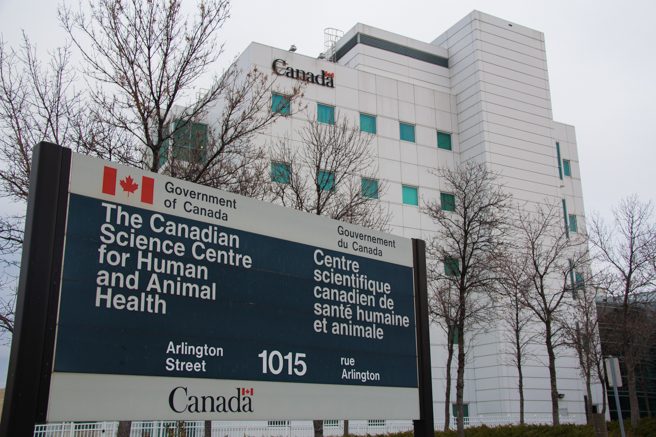An employee at Winnipeg’s National Centre for Foreign Animal Disease has potentially been exposed to the Ebola virus.
The employee who was working with six Ebola-infected pigs in a Level 4 lab on Nov. 7 noticed a rip in their protective suit during the pre-exit decontamination process. The pigs were all anesthetized, and were being moved by the employee at the time.
Ebola was first discovered in 1976, but captured the world’s attention in the midst of a large outbreak in 2014. Its symptoms are flu-like in nature, but belie Ebola’s huge fatality rate; half of the people who contract Ebola die from it. This, along with its simple human-to-human contact transmission method, resulted in a worldwide panic. During the current outbreak, over 11,000 people, most of whom are from West Africa, have died of the disease.
While officials would not speculate on how the suit was torn, they confirm that every step is taken to ensure that safety is a priority. Dr. John Copps, director of the Canadian Food Inspection Agency (CFIA), noted that the suits go through a lengthy inspection at least once a week.
“Our employees are well aware of the risks and how to control them,” Copps said in a news release last week.
“The employee had worked in the suit previously and the suit was checked rigorously and it was a new suit.”
While there is no official vaccine for the Ebola virus, the employee was offered an experimental Ebola vaccine. Due to privacy concerns, it’s not confirmed whether they took it. The employee remains in isolation (at an unconfirmed location, also due to privacy concerns) and will be observed there for at least 21 days.
The latest updates say that the danger to the public is low, and that the employee is not showing any symptoms of Ebola.
The World Health Organization officially declared Ebola to no longer be a global risk in March of this year, and research based in Winnipeg was formative to slowing down the Ebola outbreak. Earlier this year, the Microbiology Laboratory in Winnipeg developed a vaccine that pre-emptively protected any recipient against the Ebola virus.
The Canadian Science Centre for Human and Animal Health in Winnipeg is one of the only labs in North America with the facilities to study highly contagious pathogens. The lab has also done ground-breaking research in fighting other dangerous epidemics, including swine fever and avian influenza.
The employee was working as part of a study researching the effects of interferon, an FDA-approved drug, and its ability to possibly be a therapeutic strategy against the Ebola virus




